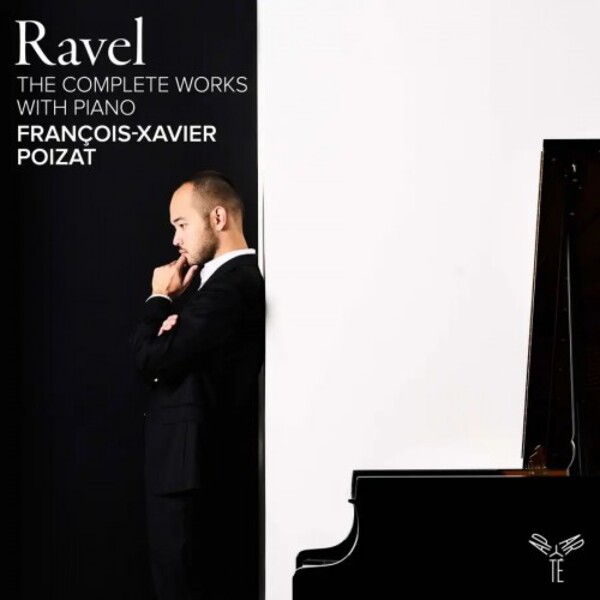RAVEL Complete Works with Piano (François-Xavier Poizat)
View record and artist detailsRecord and Artist Details
Genre:
Instrumental
Label: Aparte
Magazine Review Date: 11/2024
Media Format: CD or Download
Media Runtime: 400
Mastering:
DDD
Catalogue Number: AP321

Author: Jed Distler
Apparently 2025’s Maurice Ravel 150th-anniversary festivities are starting well in advance, with François-Xavier Poizat at the front of the line. He offers a six-CD set that features the composer’s complete works involving piano. All of the solo and chamber pieces, concertos and vocal music are here, along with the early C sharp minor Menuet, Sérénade grotesque and Violin Sonata, but none of the other posthumous items or ephemera that often turn up in comprehensive Ravel editions.
And what a stunning collection this is! For starters, the crystalline sound ideally suits the repertoire, and captures the resplendently fabled acoustics of the Salle de Musique at La Chaux-de-Fonds to perfection. Then there is Poizat’s remarkable pianism. His keyboard artistry embodies all the best qualities characterising Ravel’s greatest interpreters. Think of Arturo Benedetti Michelangeli’s laser-like precision and tonal application, Jean-Yves Thibaudet’s clarity of voicing, Marcelle Meyer’s multi-level sensitivity and Robert Casadesus’s classicism all rolled into one. Yes, Poizat is that good! What is more, the pianist’s limpid phrasing never sacrifices rhythmic backbone, while the glistening transparency of his textures from top to bottom is analogous to viewing favourite Impressionist paintings that have undergone major conservation and cleaning.
The solo piano works abound with revelations. In Miroirs, the evenness and control that Poizat brings to the left-hand arpeggios in ‘Une barque sur l’océan’ vividly evoke calm waters and cresting waves, while his wide palette of nuances creates multi-dimensional perspectives throughout ‘La vallée des cloches’. In an era where young virtuoso hotshots race through Gaspard de la nuit’s ‘Scarbo’, Poizat restores decades of missing lilt and playfulness to the repeated- and double-note sequences, allowing the abrupt mood changes to establish character. By favouring crisp dry-point precision over speedy glibness, Le tombeau de Couperin’s Toccata sounds faster than it actually transpires. In contrast to the run-on note-spinning one often hears in the suite’s Prélude, Poizat’s liberal pedalling and dynamic latitude add welcome expressive warmth to the mix. Similar observations apply to the Sonatine’s finale and the introspective episodes in a judiciously paced Valses nobles et sentimentales. In La valse (via Alexander Ghindin’s 2001 performing edition), Poizat doles out rubato in the best of taste, and stirs up the climaxes without losing definition in the low-register rumbles and fortissimo chords. The interpretation’s ‘controlled volatility’ (forgive my oxymoron) reminds me of the Roger Muraro recording that was stolen for the notorious Joyce Hatto CD edition, and that’s a compliment! Louis Schwizgebel joins Poizat for the glistening Sites auriculaires, while Anaïs Cassiers lends a fifth hand for the strange little Frontispice, whose polytextural opening section arguably presages Conlon Nancarrow’s Studies for Player Piano.
Violinist Michael Foyle’s aesthetic values jibe with Poizat’s on every level, from the expressive economy and ensemble synchronicity in their reading of both sonatas and Tzigane, not to mention one of the most lucid yet intensely focused versions of the A minor Trio on record. Poizat’s programming concept also gives us an overview of Ravel’s songs that easily rivals EMI’s landmark 1985 cycle. One doesn’t need a printed text to appreciate Thomas Dolié’s precise phrasing and impeccable diction, be it in the Histoires naturelles or the exquisitely wrought Chansons madécasses. Brenda Poupard’s silvery timbre befits her selections as much as Suzanne Jerosme’s darker timbre and more pronounced vibrato.
As for the two piano concertos, I’ve rarely heard the softest concertante woodwind and brass interactions align so specifically in the G major’s first movement, nor the second theme recapitulation’s long trills evoke a musical saw to the extent that they give Michelangeli a run for his money. In the vivid finale, conductor Simone Menezes ensures that we hear every detail of Ravel’s amazing orchestration in ideal perspective, from the off-beat pizzicato double bass accents and snarling trombones to the scurrying articulation of the perpetuum mobile strings at around 2'40". Cor anglais soloist Emily Cockbill’s evocative contributions in the slow movement also deserve mention. Each orchestral strand of the slowly unfolding primeval rumblings at the Concerto for the Left Hand’s outset can be discerned, and without sounding the least bit clinical or unduly dissected. The long march builds up from a murmur to its full-throated apogee, while Poizat integrates his brilliant virtuosity within the orchestral fabric as a team player, rather than hogging the spotlight. And who knew that Poizat had jazz chops? Actually, his mash-up of Ravel’s Pavane pour une infante défunte with the standard ‘The Lamp is Low’ isn’t exactly a new idea: I heard George Shearing do exactly the same thing in a concert years ago!
Aparté’s classy production values extend to a 124-page booklet including full texts and translations, excellent photos and essays, plus all the Philharmonia Orchestra’s members individually credited. It’s too early to predict the Ravel year’s outright new-release winner, yet Poizat’s stunning performances may well tower over much of the competition. No Ravel lover should miss this important release.
Discover the world's largest classical music catalogue with Presto Music.

Gramophone Digital Club
- Digital Edition
- Digital Archive
- Reviews Database
- Full website access
From £8.75 / month
Subscribe
Gramophone Full Club
- Print Edition
- Digital Edition
- Digital Archive
- Reviews Database
- Full website access
From £11.00 / month
Subscribe
If you are a library, university or other organisation that would be interested in an institutional subscription to Gramophone please click here for further information.




